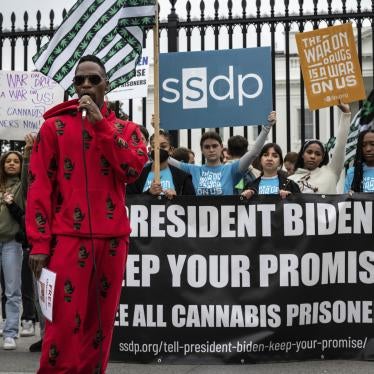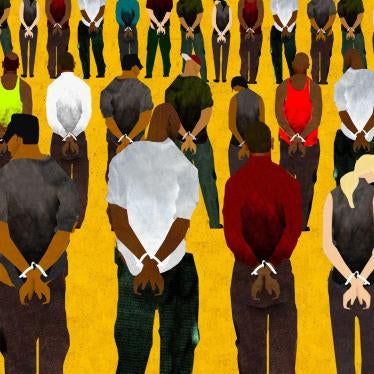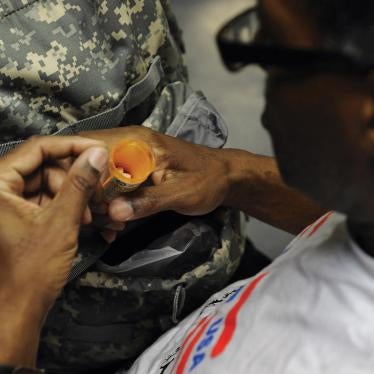The United States incarcerates the greatest number of people in the world (2.3 million), and at the highest rate (762 out of every 100,000 people). So why the never-ending prison growth? Three ill-considered policies drive it: the war on drugs, draconian sentencing laws, and punitive parole practices. The extraordinary rate of incarceration in the US is not necessary to protect the public – community-based sanctions and treatment for addiction would be even more effective at reducing most kinds of nonviolent crime and at far less cost. Meanwhile, the unnecessary incarceration of Americans damages individuals, families and communities.
According to the federal Bureau of Justice Statistics, the US prison and jail population has now grown to all-time high of 2.3 million. The United States not only incarcerates the greatest number of people in the world, it also incarcerates at the highest rate: last year 762 out of every 100,000 people in the United States were behind bars, a rate five to ten times that of other western democracies.
The endlessly growing rate of incarceration does not, however, reflect growing rates of crime. The newest FBI crime report shows that violent and property crime declined last year, and remain near historical low levels. Indeed, over the last two decades, prison populations have grown steadily regardless of whether crime was up or down, and for some years now the trend has been down.
So why the never-ending prison growth?
The short answer is that for at least a quarter of a century American criminal justice policies have not been very sensible. Prison should be used parsimoniously, reserved for those who have committed such dangerous or egregious crimes that imprisonment is the only commensurate response. Using prisons this way would protect the public, save money and meet human rights requirements.
But this is not how US prisons are utilized. Three ill-considered policies drive incarceration rates.
First: the war on drugs. Launched more than two decades ago, it is still going strong. About one third of all people entering prison with new sentences were convicted of drug charges. Few of them are kingpins or major traffickers. US prisons are swollen with men and women who sell drugs at the retail level or have menial jobs in the drug business as couriers or lookouts. More than two decades of punitive drug policies should have taught the nation a few things: That as long as a demand for drugs exists, there will be a supply. That aggressive drug law enforcement has little effect on the proportion of adults who regularly use hard drugs or even marijuana. That for every low-level drug seller sent to prison, someone else will take his or her job. Unfortunately, politicians seem to be slow learners: they continue to fund this futile and costly war rather than embracing effective and less expensive public health and harm reduction approaches to drug use.
Second: draconian sentencing laws. Politicians running on "tough on crime" platforms in the 1980s and 90s ratcheted up prison sentences by adopting a spate of laws that require imprisonment even for low-level nonviolent crimes and that require long sentences based on one or two criteria – for instance, weight of drugs sold, or a prior record. But in 2008, who really believes a life sentence makes sense for someone whose third offense consists of stealing some videos from Kmart? Who really believes that selling a small quantity of drugs to an adult should yield a decade or more behind bars?
Third: punitive parole practices. Last year, 240,000 people entered prison because their parole had been revoked, about one third of the total incoming population. Parole should be a time of supervision and support to enable former offenders to get their lives together. But too often it's a game of "gotcha." In most cases parole is revoked not because the parolee committed a new crime (although that happens) but because he or she failed urine tests for drug use, did not come to treatment meetings, or in some other way committed a technical violation of the conditions of parole. Offenders on parole should be held accountable for not complying with parole requirements. But there are cheaper and more productive ways to encourage compliance than automatic returns to prison.
The extraordinary rate of incarceration in the US is not necessary to protect the public – community-based sanctions and treatment for addiction would be even more effective at reducing most kinds of nonviolent crime and at far less cost. Meanwhile, the unnecessary incarceration of Americans damages individuals (few are better off for being in prison), families (children suffer when parents are sent away) and communities (the social capital of already vulnerable communities is further frayed by high incarceration rates.)
People who care about racial justice have spoken up to challenge a prison population that is overwhelmingly black and Hispanic. People who believe punishment should fit the crime have spoken up to criticize unduly severe sentences.
But Americans who are concerned about taxes and who want a sound return on public investments, including criminal justice investments, have remained silent in the face of the needlessly expanding, wildly expensive ($49 billion last year) prison population. It is time for them to speak up too. Until they do, the prison population may just continue endlessly and senselessly upward.







